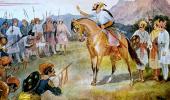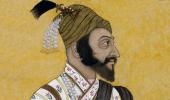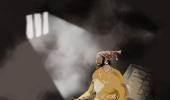Senior RSS leader Suresh Bhaiyyaji Joshi's call to drop the Aurangzeb tomb controversy challenges decades of communal rhetoric in Maharashtra, igniting hopes for unity and a balanced historical narrative.

In a statement that could possibly hem in communal rhetoric in Maharashtra over the controversy surrounding Aurangzeb's tomb in Khuldabad, Sambhajinagar district, Maharashtra, senior RSS leader Suresh 'Bhaiyyaji' Joshi dismissed the uproar over Aurangzeb's tomb as 'unnecessary,' urging restraint and invoking Shivaji Maharaj's legacy of inclusiveness.
'He (Aurangzeb) died here, so his tomb has been built here. Those who have faith will go,' Joshi declared, referencing the Maratha king's decision to honour his adversary Afzal Khan with a burial.
Located in Chhatrapati Sambhajinagar district, the 17th-century Mughal emperor's tomb has long served as a lightning rod for communal tensions, but recent weeks saw the debate escalate into protests, violence, and calls for demolition -- fueled by right-wing rhetoric and the release of the film Chhaava, which reignited anger over Aurangzeb's execution of Chhatrapati Sambhaji Maharaj.
The controversy has exposed stark divides. While BJP leaders like Maharashtra Chief Minister Devendra Fadnavis initially stoked the controversy by endorsing demands to 'remove the tomb', others, including Maharashtra Navnirman Sena chief Raj Thackeray, urged citizens to reject divisive narratives.
'Don't view history through WhatsApp forwards,' Thackeray declared at the MNS' Gudhi Padwa rally at Mumbai's Shivaji Park on March 30, advocating unity over weaponising history to gain political mileage.
Joshi's measured intervention, however, marks a huge shift: As the ideological compass of the BJP, his call to prioritise social harmony over political theatrics raises critical questions.
Can Maharashtra finally move beyond centuries-old grudges to address pressing issues like unemployment and inflation? Or will the ghost of Aurangzeb continue to haunt its future?
Amid simmering tensions and competing agendas, the state stands at a crossroads -- where history's shadows clash with the urgency of progress.

The Divisive Debate
The debate began gaining traction after the release of the film Chhava, which depicts the brutal execution of Chhatrapati Sambhaji Maharaj, Chhatrapati Shivaji Maharaj's son, by Aurangzeb. The film reignited anger against Aurangzeb among many in Maharashtra. Chief Minister Fadnavis acknowledged this connection, saying, 'The movie has triggered people's anger against Aurangzeb.'
Soon after, some BJP leaders and allies began demanding that Aurangzeb's tomb be removed. BJP MP Udayanraje Bhosale, a descendant of Shivaji Maharaj, went as far as saying, 'What is the need for the tomb? Bring in a JCB machine and raze it down. Aurangzeb was a thief and a lootera.'
Fadnavis initially seemed to support these calls but later took a nuanced view given his Constitutional position, saying that while many want the tomb removed, it is protected under the law and cannot be touched.
Meanwhile, violence broke out in Nagpur last fortnight after Hindu groups protested against the tomb and Muslims accused them of burning a chaddar wih Quranic inscriptions during the protest. Communal tensions were clearly rising.
Raj Thackeray's Call for Unity
Amid this chaos, MNS chief Raj Thackeray took a different approach.
At his Gudhi Padwa rally at Shivaji Park on March 30, Raj Thackeray urged people not to fall for divisive narratives. He criticised those relying on 'WhatsApp forwards' for historical knowledge and warned against using history to stir communal hatred.
Thackeray said something that struck a chord: 'Aurangzeb wanted to kill a thought called Shivaji but failed and died in Maharashtra.' He reminded his supporters, just like the RSS's Joshi, that Afzal Khan's burial near Pratapgadh Fort happened with Shivaji Maharaj's consent -- a sign of his greatness and inclusiveness.
Thackeray's words were a plea for understanding history with depth rather than using it as a tool for division.

Bhaiyyaji Joshi's Surprising Statement
Just as tensions seemed to escalate further, Bhaiyyaji Joshi stepped in with a surprising statement that could calm tempers.
The RSS leader dismissed the controversy over Aurangzeb's tomb as 'unnecessary' and said it should not have been raised in the first place. 'He died here (in Maharashtra), so his tomb has been built here. Those who have faith will go,' Joshi said.
Joshi also invoked Shivaji Maharaj's example to make his point: 'Shivaji Maharaj built Afzal Khan's tomb. This is a symbol of India's generosity and inclusiveness.' His remarks are being seen as an attempt by the RSS -- the ideological and cultural fountainhead of the BJP -- to rein in extreme voices within its fold.
Political observers believe Joshi's intervention could signal a shift in how the Sangh Parivar approaches such issues. A senior BJP functionary told me, "The organisation has always prioritised social harmony over momentary political gains. When Bhaiyyaji Joshi speaks, everyone listens."

The Shiv Sena (UBT) Perspective
Leaders from Uddhav Thackeray's Shiv Sena (UBT) faction have also taken a measured approach to this issue. Sanjay Raut, a key figure in the party, argued that Aurangzeb's tomb should be seen as part of Maratha history rather than something to destroy. 'For us, this is not about Aurangzeb's tomb; that is not significant to us. This (the grave) is a testament to the valour and courage of the Marathas and Chhatrapati Shivaji Maharaj,' Raut said.
Raut believes that removing the tomb would erase important battles fought by Maratha warriors against Aurangzeb -- battles that symbolise their bravery and resistance.
Can Maharashtra Move Forward?
The contrasting voices -- Raj Thackeray urging unity, Bhaiyyaji Joshi calling for restraint, and Shiv Sena (UBT) leaders focusing on Maratha pride -- offer hope that Maharashtra can move past this controversy without further dividing communities.
But some political observers remain sceptical. One observer pointed out that while Joshi's statement may moderate public rhetoric, local leaders might still use identity politics and rake up other equally communal issues for electoral gains. "The genie is out of the bottle," he said grimly.
Another observer had a more optimistic view: "The RSS understands that sustainable politics requires moving beyond historical grievances toward contemporary challenges like unemployment and inflation."
Raj Thackeray has already been raising these issues at rallies, shifting attention away from divisive debates toward real problems facing people today. His call for unity echoes what many ordinary citizens feel -- that history should not be used to spread hatred but should inspire progress.
A Ghost Laid to Rest?
Whether Maharashtra can finally put 'Aurangzeb's ghost' to rest remains uncertain. But Bhaiyyaji Joshi's intervention may signal an important turning point. If leaders across parties follow his lead and focus on unity rather than division, this controversy might fade away.
For now, though, Maharashtra stands at a crossroads -- caught between its rich history and its pressing present-day challenges. Perhaps it is time to let go of old ghosts and focus on building a future where everyone can thrive together.











 © 2025
© 2025